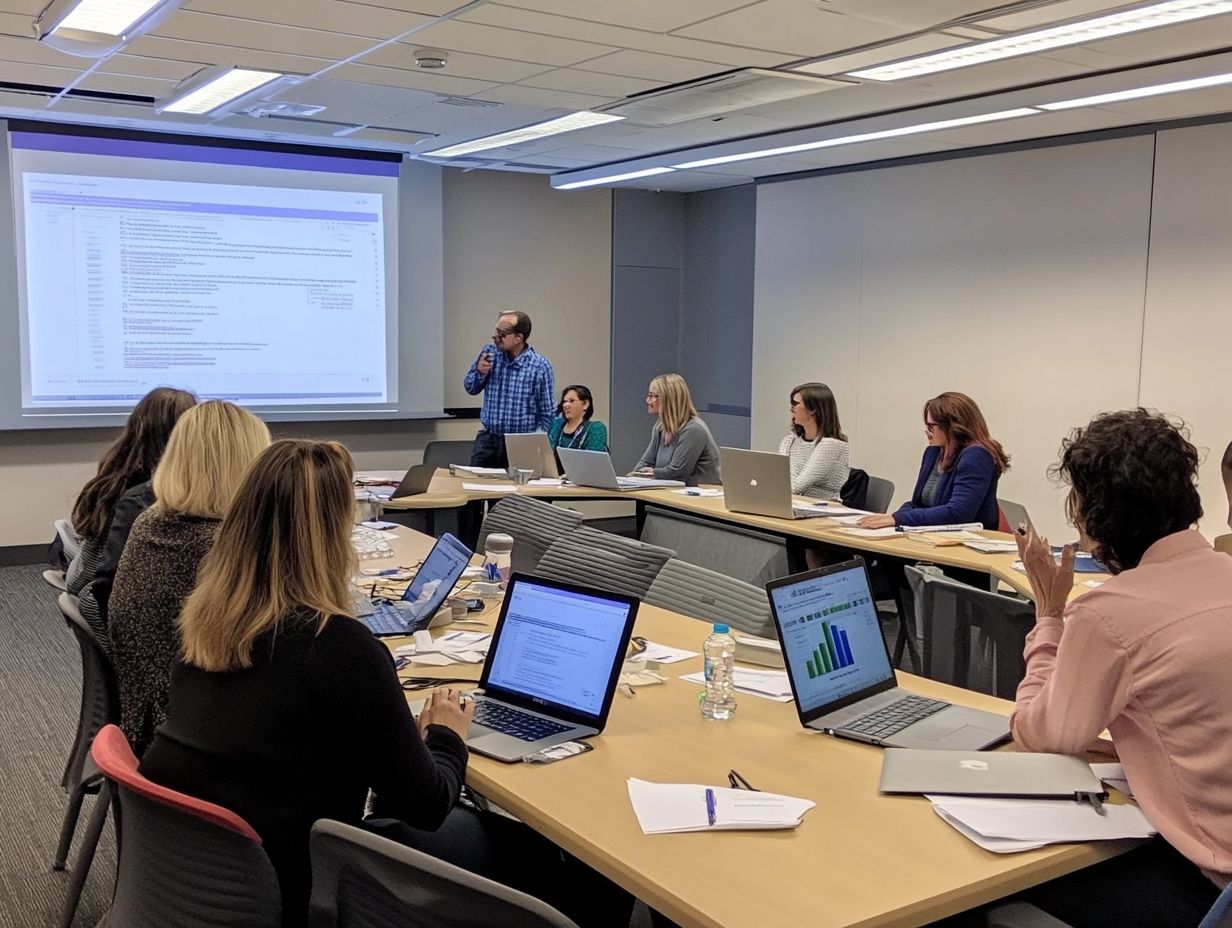“5 Popular Certificate Programs in Project Management”
In today s fast-paced business landscape, mastering effective project management is essential for your success. Whether you re a seasoned professional or just starting your career journey, earning a project management certification can truly set you apart in a competitive job market.
This article delves into five esteemed certification programs: Project Management Professional (PMP), Certified Associate in Project Management (CAPM), Agile Certified Practitioner (ACP), Certified ScrumMaster (CSM), and Program Management Professional (PgMP). You’ll find comprehensive insights into their requirements, costs, benefits, and the skills you ll acquire, along with how these certifications can elevate your career prospects across diverse industries.
Dive in now to discover the path that will ignite your career!
Contents
- Key Takeaways:
- 1. Project Management Professional (PMP)
- 2. Certified Associate in Project Management (CAPM)
- 3. Agile Certified Practitioner (ACP)
- 4. Certified ScrumMaster (CSM)
- 5. Program Management Professional (PgMP)
- What Is Project Management and Why Is It Important?
- What Are the Different Types of Project Management Certifications?
- What Are the Requirements for Each Certification?
- How Much Does Each Certification Cost?
- What Are the Benefits of Getting a Project Management Certification?
- How Can a Project Management Certification Help with Career Advancement?
- What Are the Key Skills and Knowledge Gained in Each Certification Program?
- What Are the Job Opportunities and Salaries for Certified Project Managers?
- How Can One Prepare for a Project Management Certification Exam?
- What Are the Continuing Education Requirements for Maintaining a Project Management Certification?
- How Can a Project Management Certification Benefit Different Industries?
- Frequently Asked Questions
- What are the 5 most popular certificate programs in Project Management?
- What is the Project Management Professional (PMP) certificate program?
- Who is eligible to apply for the Certified Associate in Project Management (CAPM) certificate program?
- What is the PRINCE2 Foundation certificate program?
- Is the Agile Certified Practitioner (ACP) certificate program suitable for all industries?
- What is the Certified Scrum Master (CSM) certificate program?
Key Takeaways:

The top 5 popular project management certifications are PMP, CAPM, ACP, CSM, and PgMP. Each certification has different requirements and costs, but all provide valuable skills and knowledge for career advancement. Project management certifications can benefit various industries and lead to higher job opportunities and salaries.
1. Project Management Professional (PMP)
The Project Management Professional (PMP) certification is recognized as the gold standard in project management credentials, proudly offered by the Project Management Institute (PMI). This certification proves you can manage projects effectively, lead teams, and deliver valuable results.
To earn your PMP certification, you must showcase demonstrated project experience and possess a thorough understanding of project management fundamentals. You should also apply effective communication techniques that keep important people involved and informed, enhancing team performance.
Achieving this certification sharpens your skills and elevates your career prospects in an increasingly competitive job market. To qualify, you need a minimum of 3 years of project management experience along with 35 hours of formal project management education.
The exam process is challenging and rigorously assesses your knowledge across various topics, including the project life cycle, best practices in project documentation, and the diverse roles you must fulfill from project inception to closure.
Compared to other similar certifications, the PMP stands out by offering a broader scope that emphasizes strategic and leadership competencies. This makes it particularly appealing to employers in search of adept leaders who can drive project success.
2. Certified Associate in Project Management (CAPM)
The Certified Associate in Project Management (CAPM) certification is perfect for individuals who are eager to build a career in project management. It requires less project experience than the PMP certification but still lays a strong foundation in essential project management principles and practices.
This qualification is especially advantageous for recent graduates, professionals making a career shift, or anyone looking to refine their project management skills.
To embark on this certification journey, you typically need a secondary degree and 23 hours of project management education. This ensures you are well-prepared for the challenges that lie ahead.
The CAPM is not just a certification; it’s a vital stepping stone that equips you with the essential knowledge to boost your confidence and enhance your career prospects.
With project management training gaining significance, you ll find a plethora of online courses available. These allow you to learn at your own pace while diving into the best practices, tools, and methodologies that lead to successful project outcomes.
3. Agile Certified Practitioner (ACP)
The Agile Certified Practitioner (ACP) certification shows you are serious about mastering Agile methods. It equips you with the skills needed to lead Agile projects and teams confidently.
By adopting Agile principles like adaptability and working together, you create an environment that encourages innovation. This approach helps you respond swiftly to change.
Techniques such as Scrum clarify roles and ceremonies, while Kanban focuses on steady delivery and visualizing workflows. These methods can greatly improve your team’s dynamics.
The Lean method helps you get the most value while wasting the least. With the ACP certification, you can enhance stakeholder involvement and transparency, boosting your team’s performance.
4. Certified ScrumMaster (CSM)
The Certified ScrumMaster (CSM) certification is perfect for those wanting to understand Scrum, a popular Agile framework. It gives you the skills to lead Scrum teams effectively.
As you learn, you’ll enhance your abilities and significantly contribute to your team’s success. Your role as a ScrumMaster involves coaching, resolving conflicts, and fostering a culture of working together.
This expertise is essential in Agile settings, where adaptability and communication are crucial for project success. With the CSM certification, you ll cultivate a team atmosphere where everyone feels valued and motivated to deliver quality results on time.
5. Program Management Professional (PgMP)
The Program Management Professional (PgMP) certification is for experienced project managers overseeing multiple projects. It requires a solid understanding of program and project management practices.
This certification shows your ability to manage interconnected projects effectively. Each project meets its goals while contributing to broader organizational strategies.
Unlike project management, which focuses on individual projects, program management looks at how projects work together. This optimizes resource use and boosts stakeholder satisfaction.
To excel, you should develop skills in:
- Risk management
- Budget oversight
- Leadership
- Communication
These skills help you tackle challenges and maintain budget controls, ensuring successful project outcomes.
What Is Project Management and Why Is It Important?

Project management is all about planning, executing, and overseeing projects to achieve specific goals. It helps you manage resources efficiently, reduce risks, and optimize team performance.
Following the project life cycle initiation, planning, execution, monitoring, and closure helps you navigate projects to completion. This structured approach boosts efficiency and communication.
Using recognized standards like the Project Management Body of Knowledge (PMBOK) gives you a solid framework for effective management. When applied correctly, these methods enhance business value and stakeholder satisfaction.
What Are the Different Types of Project Management Certifications?
You ll find a variety of project management certifications available, each tailored to different skill levels and areas of expertise.
Among these are the Project Management Professional (PMP), Certified Associate in Project Management (CAPM), Agile Certified Practitioner (ACP), and several others designed for specific methodologies and industries.
These certifications not only show what you know but also enhance your career prospects by aligning with specific roles within organizations.
For example, while the PMP certification focuses on traditional project management techniques, the ACP certification emphasizes Agile methodologies, which prioritize flexibility and team collaboration, making it ideal for those eager to lead dynamic, iterative project teams.
If you’re overseeing multiple projects, credentials like the Program Management Professional (PgMP) will be invaluable. They ensure that all projects align seamlessly with your organization s strategic goals.
Each certification helps narrow down your focus, allowing you to choose a path that best suits your career aspirations and keeps you competitive in a rapidly evolving job market.
What Are the Requirements for Each Certification?
Each project management certification has its own unique set of requirements that you must meet, including educational qualifications, relevant project experience, and the successful completion of a certification exam.
Take the Project Management Professional (PMP) certification, for instance. It typically requires you to hold a four-year degree and have 36 months of leading projects, along with completing 35 hours of project management education.
The Certified Associate in Project Management (CAPM) is a more accessible option, requiring only a secondary degree and 23 hours of project management training.
If you’re leaning toward the Agile Certified Practitioner (ACP) certification, you’ll need a solid understanding of agile practices. Prior project management experience can give you an edge.
To prepare effectively, you can access a wealth of resources, including online courses, study groups, and official PMI materials, which all help cultivate a strong grasp of the certification content.
How Much Does Each Certification Cost?
The costs associated with project management certifications can vary significantly based on the type of certification you pursue, the training courses you select, and whether you hold membership in professional organizations like the Project Management Institute.
When considering certification, it’s crucial to account for various expenses. Exam fees alone can range from a few hundred to over a thousand dollars, depending on the specific certification you choose.
The cost of study materials can also add several hundred dollars more to your total investment. This includes textbooks, online courses, or practice exams.
Training courses also impact your expenses. These often provide guided instruction and essential resources for preparation, and their prices can vary based on the provider and whether you choose in-person or online delivery.
If the costs seem daunting, explore financial assistance options, such as scholarships or employer reimbursement programs. These can offer valuable support in your pursuit of these important credentials.
What Are the Benefits of Getting a Project Management Certification?
Obtaining a project management certification can truly transform your career! It validates your skills, expands job opportunities, and often leads to higher salaries and career advancement within the field.
In today s competitive job market, this professional recognition is particularly appealing. Employers increasingly seek candidates who can demonstrate their ability to manage complex projects with proficiency.
When you invest in certifications, you ll likely find that your enhanced knowledge sharpens your project management techniques. This also boosts your overall capacity to lead teams and collaborate effectively.
These certifications align with industry standards and best practices, making them invaluable assets that reflect your commitment to excellence and continuous improvement in the dynamic realm of project management.
Start your certification journey today!
How Can a Project Management Certification Help with Career Advancement?
A project management certification can be a game-changer for your career, providing you with recognized credentials that highlight your expertise and commitment to the profession.
These certifications do more than just enhance your theoretical knowledge; they equip you with practical skills that employers truly value. By obtaining such credentials, you position yourself as a prime candidate for promotions within your organization, showcasing your capability to manage projects effectively and efficiently.
For instance, if you re in fields like IT, construction, or healthcare, acquiring specific project management certifications can significantly elevate your career trajectory.
In today s job market, having a recognized certification distinguishes you from other candidates, making you more appealing to hiring managers searching for capable leaders to drive their projects to success.
What Are the Key Skills and Knowledge Gained in Each Certification Program?

Each project management certification program equips you with essential skills and knowledge crucial for effective project management. These skills include managing risks, overseeing budgets, and working well with everyone involved in a project.
Take the Agile Certified Practitioner (ACP), for example. It deepens your understanding of Agile methodologies, which focus on flexibility and customer satisfaction, enabling you to adapt swiftly to change in project delivery.
Meanwhile, the Project Management Professional (PMP) certification hones your leadership skills, enabling you to inspire team collaboration and navigate complex project landscapes confidently.
Similarly, the Certified ScrumMaster (CSM) zeroes in on the nuances of teamwork dynamics, teaching you how to create a collaborative environment that boosts productivity. These competencies seamlessly translate into real-world scenarios, where managing diverse teams and meeting project deadlines demands not just technical expertise but also exceptional interpersonal skills.
What Are the Job Opportunities and Salaries for Certified Project Managers?
Certified project managers find many job opportunities across various industries, with competitive salaries that reflect their expertise and the surging demand for skilled professionals in project management.
As organizations work diligently to enhance efficiency and achieve successful project outcomes, the need for certified individuals has become increasingly evident. Sectors such as IT, construction, healthcare, and finance are actively seeking qualified project managers to oversee intricate initiatives and streamline their operations.
Recent statistics indicate that certified professionals can command an average salary ranging from $85,000 to over $130,000 annually, influenced by their experience and the specific industry in which they operate. Job opportunities in project management are booming, with an expected growth of 11% in the next decade, emphasizing the abundant career advancement opportunities awaiting those with professional credentials.
How Can One Prepare for a Project Management Certification Exam?
Preparing for a project management certification exam calls for a strategic approach that combines thorough studying, practice exams, and leveraging quality project management training resources and online courses.
To navigate this journey effectively, you need to craft a comprehensive study plan that breaks down the syllabus into manageable sections, ensuring you allocate consistent time for each topic.
Incorporating respected textbooks and enrolling in engaging online courses can significantly enhance your understanding. Participating in study groups provides valuable collaborative learning opportunities and diverse perspectives.
Gaining hands-on project experience is invaluable; it not only reinforces your theoretical knowledge but also helps you develop practical skills critical for exam success. Engaging with real-world scenarios will boost your confidence and prepare you for the challenges you may encounter as a certified project manager.
Don t miss out on the chance to boost your credentials! Take the first step toward certification today and unlock your potential!
What Are the Continuing Education Requirements for Maintaining a Project Management Certification?
You need to meet specific continuing education requirements. This ensures you stay current with the latest practices and trends in the field.
To keep your skills sharp and your knowledge up to date, you will need to accumulate a specific number of Professional Development Units (PDUs) within a defined timeframe. For example, a popular certification might demand 60 PDUs every three years, encouraging you to pursue ongoing education through formal classes, workshops, or even self-directed study.
Online courses and industry conferences can supercharge your skills and connect you with key professionals! Volunteering in project management roles can contribute to your PDUs as well. By actively seeking out these enriching learning avenues, you can effectively advance your expertise and enhance your credentials.
How Can a Project Management Certification Benefit Different Industries?
A project management certification can provide you with a wealth of advantages across various industries, enhancing your capacity to manage projects effectively, boost team performance, and implement customized project management frameworks.
In the IT sector, you can harness Agile methodologies, allowing you to maintain flexibility and swiftly adapt to changing requirements, ensuring that your software development projects truly meet user needs.
In healthcare, certifications enable you to adopt structured approaches that align with stringent regulatory demands while keeping your focus on patient outcomes.
The construction industry also stands to gain, as you can utilize PMI standards to streamline project phases and effectively manage the inherent risks associated with large-scale builds.
Similarly, in finance, as a certified project manager, you can embrace a tailored strategy that emphasizes compliance and precision, adeptly navigating the complexities of financial regulations while driving your projects toward successful completion.
Frequently Asked Questions
What are the 5 most popular certificate programs in Project Management?

The five most popular certificate programs in Project Management are: Project Management Professional (PMP), Certified Associate in Project Management (CAPM), PRINCE2 Foundation, Agile Certified Practitioner (ACP), and Certified Scrum Master (CSM).
What is the Project Management Professional (PMP) certificate program?
The Project Management Professional (PMP) certificate program is a globally recognized certification offered by the Project Management Institute (PMI). It is designed for experienced project managers and focuses on the five process groups and ten knowledge areas outlined in the PMBOK (Project Management Body of Knowledge).
Who is eligible to apply for the Certified Associate in Project Management (CAPM) certificate program?
The Certified Associate in Project Management (CAPM) certificate program is open to anyone interested in project management, regardless of their experience level. However, individuals must have a secondary degree (high school diploma or equivalent) and a minimum of 1,500 hours of project experience, or 23 hours of project management education, to be eligible to take the exam.
What is the PRINCE2 Foundation certificate program?
The PRINCE2 Foundation certificate program is a project management methodology developed by the UK government. It focuses on processes, themes, and principles for successful project management and is widely recognized in Europe and other parts of the world.
Is the Agile Certified Practitioner (ACP) certificate program suitable for all industries?
Yes, the Agile Certified Practitioner (ACP) certificate program is suitable for individuals working in any industry. It is based on the principles of agile project management, which can be applied to any type of project, regardless of the industry or sector.
What is the Certified Scrum Master (CSM) certificate program?
The Certified Scrum Master (CSM) certificate program is a widely recognized certification for individuals interested in agile project management, specifically using the Scrum framework. It is offered by the Scrum Alliance and focuses on the roles, events, and artifacts involved in Scrum projects.






